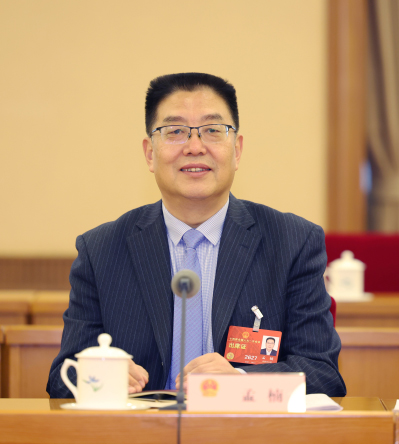| China |
| Xinjiang deputy urges further study of region's cultural legacy | |
|
|
 Meng Nan, a professor of ethnicity and Central Asian studies at Xinjiang University in Urumqi and a deputy to the 14th National People’s Congress (COURTESY PHOTO)
For more than two millennia, people in Xinjiang have developed diverse cultures as part of the Chinese civilization, a national lawmaker and scholar of ethnicity said. Xinjiang was included into Chinese territory in 60 B.C. during the Han Dynasty (206 B.C.-A.D. 220) and the central governments of all dynasties maintained jurisdiction over the region, Meng Nan, a professor of ethnicity and Central Asian studies at Xinjiang University in Urumqi, the regional capital, and a deputy to the 14th National People's Congress (NPC), told Beijing Review in an interview on March 5. "The Uygur ethnic group came into being through a long process of migration and integration. Different cultures and religions coexist and have been fostered in the embrace of Chinese civilization," he said, adding that promoting a greater understanding of the region's history and ethnicities helps build unity and celebrate diversity. Xinjiang Uygur Autonomous Region in the northwest, home to all 56 Chinese ethnicities, is one of China's most ethnically diverse regions. At the end of 2021, its population totaled 25.89 million, 57.76 percent of whom were from minority ethnic groups--those except the Han, the majority ethnic group. Xinjiang covers an area of 1.66 million square km, accounting for one sixth of the country's land territory. Xinjiang is a region at the crossroads of eastern and western civilizations and the archaeological discoveries made there have significantly contributed to understanding of the ancient world, Meng said, adding universities in Xinjiang have strengths in studying ethnic integration and local history. "We were the first to delve into Xinjiang's local history, its engagement with neighboring countries, and how to view its history within the broader context of Chinese history," Meng said. "In 1970s and 1980s, we had all these trailblazers like historians Wei Liangtao and Su Beihai, who have shed light on previously unknown aspects of Xinjiang's history. But their retirements or deaths have left a huge vacuum of expertise. As the nation's educational and human resources are concentrated in the more developed eastern region, Xinjiang needs to grow its talent pool and put policies in place to attract and retain them." "As an NPC deputy, I would like to suggest more efficient management of recruitment and lower entry thresholds for urgently needed talent," Meng said. The First Session of the 14th NPC, the highest state organ of power, is taking place in Beijing on March 5-13. The duties of NPC deputies, who serve five-year terms, include gathering public opinion and regularly carrying out field research to gain an understanding of economic and social development in the areas they represent. Meng has discussed the difficulties recruiting teaching staff and doctoral students with university leaders and faculties, collecting feedback from universities, research institutes and companies. The proposal he will make to the NPC is based on the consensus reached among these stakeholders. "We are elected by the people. We cannot let them down," he added. Copyedited by G.P. Wilson Comments to liwenhan@cicgamericas.com |
|
||||||||||||||||||||||||||||
|